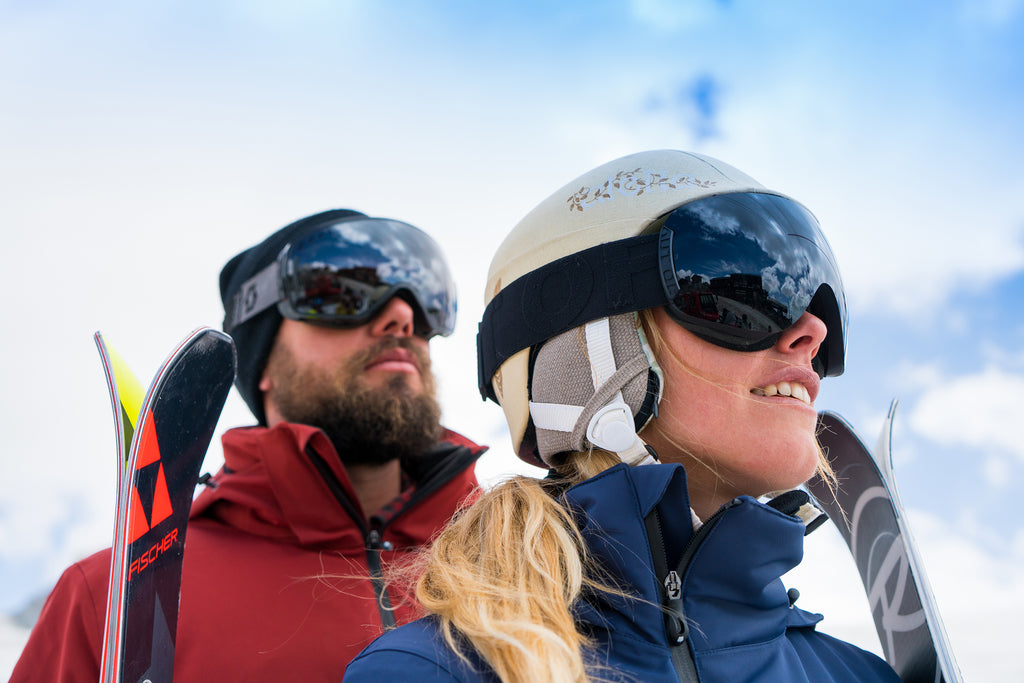How to Protect Your Face in Cold Weather
Nov 15, 2018
< Back to Feed
Sure, the obvious answer for protecting your skin in the bitter cold is to cover it. The area that’s hardest to cover up though is your face. On the ski slopes, you can go full balaclava, but even then you’ll have a few exposed areas and the cold can still seep through. Plus, depending on your outdoor activity or style preferences, you might want alternative options. From your skincare routine to daily habits, there are many ways to combat winter’s harsh effects.
A few modifications for winter will bolster your skin against dryness and irritation.
Try a gentle cream cleanser
A gentle non-foaming cream formula will cleanse your face without stripping it of moisture. Avoid any harsh cleansers, especially with SLS, that can cause dryness.
Wash with lukewarm water
It’s tempting to crank the water all the way hot when it’s cold out. However, use lukewarm water instead to wash your face to avoid breaking down your skin’s lipid barrier and exacerbating irritation.
Switch to an oil-based moisturizer
An oil-based (vs. water based) formula will help seal in moisture in the winter. Also, moisturize more frequently than in warmer months.
Use a protecting balm when you’re out in the cold
We’re obviously partial to our BRR! Winter Balm. It delivers heavy duty protection from the elements. This balm creates a protective barrier on your skin, without feeling greasy, to combat the wind and cold through our high performance botanical blend.
Eat foods high in Omega-3s
Eating foods high in healthy fats like nuts, avocados, and salmon can give your skin a boost and may improve barrier function. There have been studies showing the impact of Omega-3s on skin elasticity and resilience stemming from the ability of the Inuit, who follow this diet, to withstand the cold.
Stay Hydrated
It’s easy to drink less water in the winter as your body craves warmth and you turn to hot drinks instead. But don’t forget, your skin still needs hydration. If you want warmth plus hydration try warm water with lemon.
Turn on the humidifier
Increase the moisture in the air with a humidifier. Turn one on while you sleep to help restore your skin from the day’s cold exposure.
Article originally posted on our sister site, brrskincare.com
Your Skincare Routine
A few modifications for winter will bolster your skin against dryness and irritation. Try a gentle cream cleanser
A gentle non-foaming cream formula will cleanse your face without stripping it of moisture. Avoid any harsh cleansers, especially with SLS, that can cause dryness.
Wash with lukewarm water
It’s tempting to crank the water all the way hot when it’s cold out. However, use lukewarm water instead to wash your face to avoid breaking down your skin’s lipid barrier and exacerbating irritation.
Switch to an oil-based moisturizer
An oil-based (vs. water based) formula will help seal in moisture in the winter. Also, moisturize more frequently than in warmer months.
Use a protecting balm when you’re out in the cold
We’re obviously partial to our BRR! Winter Balm. It delivers heavy duty protection from the elements. This balm creates a protective barrier on your skin, without feeling greasy, to combat the wind and cold through our high performance botanical blend.
Your Daily Habits
Diet and indoor habits also affect your skin’s resilience to winter’s coldEat foods high in Omega-3s
Eating foods high in healthy fats like nuts, avocados, and salmon can give your skin a boost and may improve barrier function. There have been studies showing the impact of Omega-3s on skin elasticity and resilience stemming from the ability of the Inuit, who follow this diet, to withstand the cold.
Stay Hydrated
It’s easy to drink less water in the winter as your body craves warmth and you turn to hot drinks instead. But don’t forget, your skin still needs hydration. If you want warmth plus hydration try warm water with lemon.
Turn on the humidifier
Increase the moisture in the air with a humidifier. Turn one on while you sleep to help restore your skin from the day’s cold exposure.
Article originally posted on our sister site, brrskincare.com
